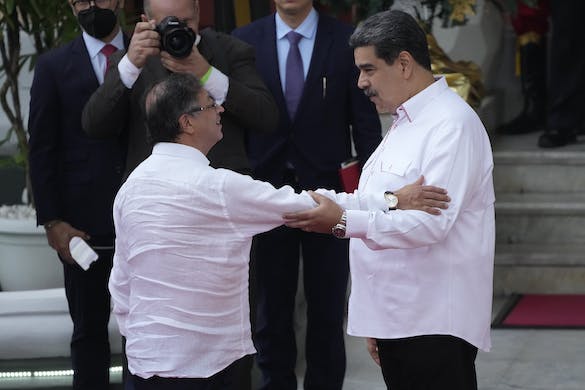Biden Joins Latin American Leftists in Cozying Up to Caracas
Maduro intends to resume parleying with Venezuela’s opposition.

President Maduro’s announced intention to resume negotiations with the country’s opposition later this month at Mexico City may indicate progress in restoring democratic rights to the Venezuelan people.
That’s the word from the state department spokesman, Ned Price. It indicates yet another step in Washington’s warming up to Mr. Maduro, even as Mr. Price added that until rights are re-established in Venezuela, sanctions on Caracas will “remain.”
At the White House, the National Security Council spokeswoman, Adrienne Watson, said sanctions will be reviewed “in response to constructive steps by the Maduro regime to restore democracy in Venezuela.”
Yet, President Biden reportedly is already considering lifting sanctions on Venezuela to allow Chevron Corporation to resume pumping oil there. Earlier this year, Washington and Caracas completed a prisoner swap, with seven Americans released in exchange for two of Mr. Maduro’s nephews, who were convicted in a New York federal court of drug trafficking.
The process of easing Venezuela’s isolation, in other words, is already moving ahead. “Conversations between Maduro and the White House will increase,” a Venezuelan political consultant, Pablo Quintero, told the Sun. “Progressively, they will begin lifting sanctions.”
Washington, nevertheless, says sanction removal will depend on reopening suspended negotiations between Mr. Maduro and opposition groups in the country, leading up to a presidential election in 2024.
Such talks are unlikely to lead to free and fair elections under Mr. Maduro’s authoritarian rule, a Venezuelan-born associate at the Center for Strategic and International Studies, Alexandra Winkler, told the Sun. In order for that to happen, she says, the entire electoral system would have to change, including the National Electoral Council and the Supreme Court, which are under the influence of Mr. Maduro.
In addition, Ms. Winkler says there is no “incentive” for Mr. Maduro to have meaningful negotiations with the opposition, as conversations with Mr. Biden are occurring.
Mr. Maduro already has a “direct line to Washington,” director of the American Program at the Center for Strategic and International Studies, Ryan Berg, says. “What Maduro seeks is a return of assets and lifting of more sanctions without having to negotiate meaningful electoral concessions.”
Mr. Biden, however, hopes that ending Venezuela’s isolation will boost his efforts to combat ever-rising global oil prices and a growing immigration crisis.
In September, Customs and Border Protection encountered more than 270,000 Venezuelans attempting to cross the southern border. Mr. Maduro has reportedly freed criminals from the country’s prisons and sent them to America’s border. Meanwhile, the OPEC+ refusal to increase oil production pushes oil rates, currently at near $90 a barrel, ever higher.
To facilitate the thaw with Washington, Caracas announced that talks between Mr. Maduro and the opposition, which were suspended last year, will resume in mid-November in Mexico, in an attempt at mapping a plan to conduct the 2024 presidential elections.
A similar negotiation between Mr. Maduro’s representatives and the Venezuelan opposition last year ended quickly. Mr. Maduro walked out on the talks after only one meeting. This time, Norway will oversee the Mexico City negotiation over the status of hundreds of political prisoners in Mr. Maduro’s dungeons, the American sanctions, and global humanitarian aid.
While America stealthily courts Mr. Maduro, Latin America’s leaders are rushing to pal-up with the Hugo Chavez-Fidel Castro Caracas disciple. The most recent addition to the continent’s cadre of leftists is Lula da Silva of Brazil, who won presidential elections on Sunday against the right-wing president, Jair Bolsonaro. The region’s seven largest economies are now led by leftists who are ideologically close to Mr. Maduro.
On Tuesday, Colombia’s leftist president became the first Bogota leader to meet Mr. Maduro since 2016. Relations between the two countries were severed in February 2019. Now President Petro is calling to reintegrate Venezuela into regional free-trade agreements like the Andean Community and other treaties, such as the Inter-American Commission on Human Rights.
In a joint statement released after the meeting Mr. Petro announced his support for Mr. Maduro in the negotiations with the country’s opposition.
By meeting with his Colombian compadre, Mr. Maduro is hoping to show “strength,” “stability,” and “full force” in the region, and he will aim to do the same with Brazil’s future president Mr. da Silva, Ms. Winkler says.

